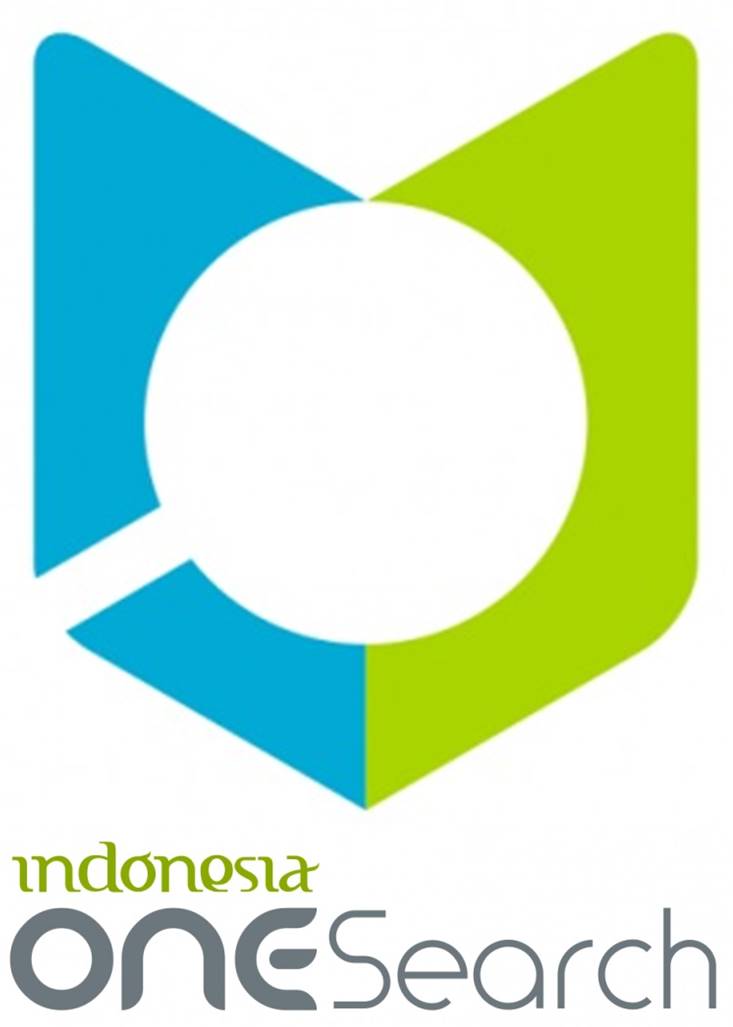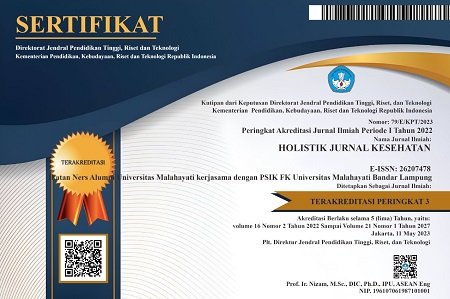Inhalasi aromaterapi peppermint dan jahe untuk mengurangi nyeri serta kelelahan pada pasien kanker yang menjalani kemoterapi
Abstract
Background: Cancer is a group of diseases characterized by the uncontrolled growth and spread of abnormal cells. In 2020, cancer is the cause of death for around 9.9 million people. One of the pharmacological therapies that can treat cancer is chemotherapy. Side effects of chemotherapy can cause pain and fatigue. Previous studies have given ginger to reduce nausea.
Purpose: To determine the effectiveness of peppermint and ginger essential oil to reduce pain and fatigue in cancer patients undergoing chemotherapy
Method: Pre-experimental without control one group pretest-posttest design, sampling using purposive sampling, with a total sample of 41 people at the Bandung Cancer Society Shelter House from July to August 2022, the instrument used for intensity Pain is a pain intensity checklist sheet, namely the CPS (Comparative Pain Scale) while fatigue uses the BFI (Brief Fatigue Inventory) which is a questionnaire to measure fatigue in cancer patients
Results: The level of pain and fatigue in patients with chemotherapy before using peppermint was mostly 27 (65.9 percent) had moderate pain. After using peppermint, almost all participants 29 (70.7 percent) had moderate pain, the level of pain and fatigue in patients with chemotherapy before using ginger was mostly 27 (65.9 percent) moderate pain, after using ginger mostly 24 (58.5 percent) mild pain. Statistically, the effectiveness of both shows a p-value of 0.001 < the alpha value (0.05).
Conclusion: Peppermint and ginger aromatherapy are effective in reducing pain levels and fatigue levels.
Suggestion: The peppermint and ginger aromatherapy can be used as an alternative to reduce pain and fatigue in cancer patients undergoing chemotherapy
Keywords: Peppermint (Mentha x piperita); Ginger (Zingiber officinale); Chemotherapy; Fatigue; Pain.
Pendahuluan: Kanker merupakan sekelompok penyakit yang ditandai dengan pertumbuhan dan penyebaran sel abnormal yang tidak terkontrol. Pada tahun 2020 kanker menjadi penyebab kematian bagi sekitar 9,9 juta jiwa. Salah satu terapi farmakologis yang dapat mengatasi kanker adalah kemoterapi. Efek samping kemoterapi dapat mengakibatkan nyeri dan fatigue. Penelitian sebelumnya pemberian jahe untuk mengurangi rasa mual.
Tujuan: Untuk mengetahui keefektifan Inhalasi aromaterapi peppermint dan jahe untuk mengurangi nyeri serta kelelahan pada pasien kanker yang menjalani kemoterapiMetode: Pre eksperimen tanpa control one group pretest-posttest design, pengambilan sample menggunakan purposive sampling, dengan jumlah sample 41 orang yang ada di rumah singgah Bandung Cancer Sosiety pada bulan Juli sampai dengan Agustus 2022, Instrumen yang digunakan untuk intensitas nyeri adalah lembar chek list intensitas nyeri yaitu CPS (Comparative Pain Scale) sedangkan kelelahan menggunakan BFI (Brief fatigue inventory) merupakan quesioner untuk mengukur kelelahan pada pasien kanker.
Hasil: Tingkat nyeri dan kelelahan pada pasien dengan kemoterapi sebelum menggunakan pepermint adalah sebagian besar 27 (65,9 persen) nyeri sedang. Sesudah mengunakan pepermint hampir seluruh partisipan 29 (70,7 persen) nyeri sedang, tingkat nyeri dan kelelahan pada pasien dengan kemoterapi sebelum mengunakan jahe sebagaina besar 27 (65,9 persen) nyeri sedang, sesudah mengunakan jahe sebagian besar 24 (58,5 persen) nyeri ringan. Efektifitas keduanya secara statistik menunjukkan nilai p-value 0,001 < dari nilai alpha (0.05).
Simpulan: Pemberian aromaterapi peppermint dan jahe efektif untuk menurunkan tingkat nyeri dan tingkat kelelahan.
Saran: Pemberian aromaterapi peppermint dan jahe dapat dijadikan alternatif untuk mengurangi nyeri dan kelelahan pada pasien kemoterapi.
Keywords
References
Ahmad, J. (2013). Aneka manfaat ampuh rimpang jahe untuk pengobatan. Yogyakarta: Dandra pustaka indonesia.
Ali, B., Al-Wabel, N. A., Shams, S., Ahamad, A., Khan, S. A., & Anwar, F. (2015). Essential oils used in aromatherapy: A systemic review. Asian Pacific Journal of Tropical Biomedicine, 5(8), 601-611.
Alivian, G. N., & Taufik, A. (2021). Aromaterapi Sebagai Terapi Komplementer untuk Mengatasi Nyeri, Depresi, Mual dan Muntah pada Pasien Kanker: A Literature Review. Journal of Bionursing, 3(1), 1-11.
Bergin, A. R. T., Hovey, E., Lloyd, A., Marx, G., Parente, P., Rapke, T., & De Souza, P. (2017). Docetaxel-related fatigue in men with metastatic prostate cancer: a descriptive analysis. Supportive Care in Cancer, 25, 2871-2879.
Black, J. M., & Hawks, J. H. (2014). Keperawatan medikal bedah: manajemen klinis untuk hasil yang diharapkan. Elsevier (Singapore).
Cancer Council (2022). Understanding chemotherapy; A guide for people with cancer, their families and friends. Diakses dari: https://www.cancer.org.au/assets/pdf/understanding-chemotherapy-booklet.
Goulart, F. S. (1995). Super Healing Foods : Discover the Incredible Healing Power of Natural Foods. Penguin Publishing Group.
Handayani, S., & Kusuma, P. D. (2020). Manajemen Mual dan Muntah dengan Aromaterapi Pada Klien Kanker Serviks (Management of Nausea and Vomiting With Aromatherapyi Patients With Cervic Cancer). Prosiding Diseminasi Hasil Penelitian Dosen Program Studi Keperawatan dan Farmasi Volume 2 Nomor 1 Bulan Januari Tahun 2020.
Hartini, S., Winarsih, B. D., & Nugroho, E. G. Z. (2020). Peningkatan Pengetahuan Perawat Untuk Perawatan Anak Penderita Kanker. Jurnal Pengabdian Kesehatan, 3(2), 141-149.
Hero, S. (2021). Faktor Risiko Kanker Payudara. Jurnal Medika Hutama, 3(01 Oktober), 1533-1537.
Karim, U. N., Dewi, A., & Hijriyati, Y. (2021). Psikososial Pasien Kanker Nasofaring Pasca Kemoterapi di Lantai VIII Gedung A RSUPN Cipto Mangunkusumo Jakarta: Laporan Penelitian.
Kementerian Kesehatan Republik Indonesia. (2019). Cerdik Tanggulangi kanker. Diakses dari: https://www.kemkes.go.id/article/print/19082000006/cerdik-tanggulangi-kanker.html.
Masruroh, S., & Wulan, A. J. (2016). Khasiat Jahe (Zingiber officinale) Sebagai Anti Mual dan Muntah pada Wanita Hamil. Medical Journal of Lampung University [MAJORITY], 5(1), 107-111.
Narayanan, V., & Koshy, C. (2009). Fatigue in cancer: a review of literature. Indian journal of palliative care, 15(1), 19.
Nugroho, S. T., & Anggorowati, A. J. (2017). Kualitas tidur dan fatigue pada klien cancer. Adi Husada Nursing Journal, 3(1), 88-92.
Nuwa, M. S. (2018). Pengaruh Kombinasi Progressive Muscle Relaxation Dengan Spiritual Guided Imagery And Music Terhadap Koping Dan Resiliensi Pasien Kanker Yang Menjalani Kemoterapi (Doctoral dissertation, Universitas Airlangga).
Pranita, E., & Sumartiningtyas, H. K. N. (2021). Kasus baru dan kematian akibat kanker di Indonesia naik 8,8 persen. Diakses dari: https://www.kompas.com/sains/read/2021/04/03/200000623/kasus-baru-dan-kematian-akibat-kanker-di-indonesia-naik-8-8-persen?page=all.
Syarif, H., & Putra, A. (2014). Pengaruh Progressive Muscle Relaxation Terhadap Penurunan Kecemasan Pada Pasien Kanker Yang Menjalani Kemoterapi; A Randomized Clinical Trial. Idea Nursing Journal, 5(3), 1-8.
Tumina, M. S., & Yona, S. (2021). Penerapan Intervensi Berbasis Evidence Based Practice untuk Mengatasi Efek Samping pada Pasien yang Menjalani Kemoterapi. Jurnal Keperawatan, 13(1), 99-110.
World Health Organization. (2021). World Source: Globocan 2020. Diakses dari: https://gco.iarc.fr/today/data/factsheets/populations/900-world-fact-sheets.pdf.
DOI: https://doi.org/10.33024/hjk.v17i1.8744
Refbacks
- There are currently no refbacks.
Copyright (c) 2023 Holistik Jurnal Kesehatan

This work is licensed under a Creative Commons Attribution-NonCommercial 4.0 International License.














